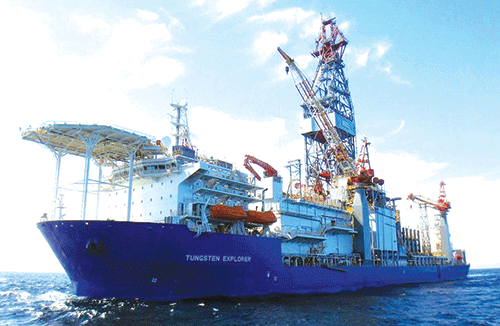The global oil exploration industry is pulsating with unconfirmed news of a second oil discovery off the coast of Namibia.
The speculation is that TotalEnergies, exploring in Block 2913B just west of Shell’s recent Graff-1 discovery, may have made a promising discovery at its Venus well.
However, a spokesperson for TotalEnergies has thus far declined to comment on the status of the Venus well. TotalEnergies has a 40% interest in Venus-1, with QatarEnergy at 30%, Impact Oil & Gas holding with 20% and the National Petroleum Corporation of Namibia (Namcor) having the remaining 10%.
According to global oil, gas and energy news resource Upstream, “if the results of the Venus well meet pre-drill expectations of a multi-billion barrel find, it will be a huge boon to other explorers in the Orange basin, already buzzing about the scale of Shell’s Graff discovery”.
TotalEnergies’ Venus-1 well is targeting a multi-billion barrel prospect located in about 3000 metres of water. On Monday, Upstream reported that the Venus-2 probe entered the target reservoir, and that “initial indications are positive”.
Upstream also quoted numerous industry sources, one of whom said initial results are “very, very encouraging”, suggesting that Venus-1 had hit oil and gas in “a very thick reservoir”. Another source remarked that TotalEnergies is probing a prospect that is “much bigger than Graff”, which oil and gas exploration consultancy Wood Mackenzie estimates could host about 700 million barrels of oil. Despite these positive initial indicators, another source familiar with the exploration well urged caution, stressing it was too early to say if a major discovery has been made because the probe “is still in a critical zone”.
Commenting on the possible oil discovery, Olayinka Arowolo, CEO of Nabirm, a Windhoek-based oil and gas explorer, told New Era: “This is an amazing reality for the Namibian compact. Personally, I am overwhelmed but proud of one of the best countries in the world that gives you the best comfort level to do business. We have known it all along. The science has always been on our side and a discovery was always a function of time, resources and opportunity”.
Nabirm’s long-term strategy is to build a pan-African portfolio of high upside exploration licences, combined with near-term material drilling opportunities.
Meanwhile, the Venus-1 well is aiming for a multi-billion-barrel structure that seismic and other data indicated covered a huge area of about 600 square kilometres. For any discovery to be commercial in 3000 metres’ deep waters, it will have to be a significant resource. However, even if Venus-1 fails to find commercial volumes of oil, it is believed exploration activities in the Orange Basin are “about to explode”.
Industry experts believe the promise of the Graff and Venus wells will likely trigger an increase in drilling activity in the Orange Basin in Namibian territory as well as across the maritime boundary in South Africa, where TotalEnergies and Qatar Energy recently secured major in what is called the Orange Basin Deep Water block.
During a recent meeting, energy minister Tom Alweendo said discovering oil needs not be a resource curse, also known as a paradox of plenty, for Namibia. The resource curse usually refers to the failure of resource-rich countries to benefit fully from their natural resources wealth, and for governments in these countries to respond effectively to public welfare needs.
“Once a discovery has been confirmed, we will have to discuss it judiciously for it not to be a resource curse,” said Alweendo. He also emphasised the need for local oil and gas industry skills to support any industrial activity.
When quizzed about a potential contradiction between Namibia’s renewable energy aspirations and the discovery of fossil fuels, the minister replied: “To me, there is no contradiction”.
He explained that any energy transition from fossil fuels to renewables would have to be a just transition. “Fossil fuels can help Namibia’s energy transition into renewables… obviously we are aware that eventually fossil fuels will be entirely phased out,” said Alweendo.
The minister highlighted that any transition to renewables will be a costly exercise for Namibia, which is where some of the revenue generated through fossil fuels would be utilised.
Total 1
Massive undertaking… The 7th generation drillship Maersk Voyager has been mobilised to drill the Venus prospect.
Photo: Maersk Drilling



